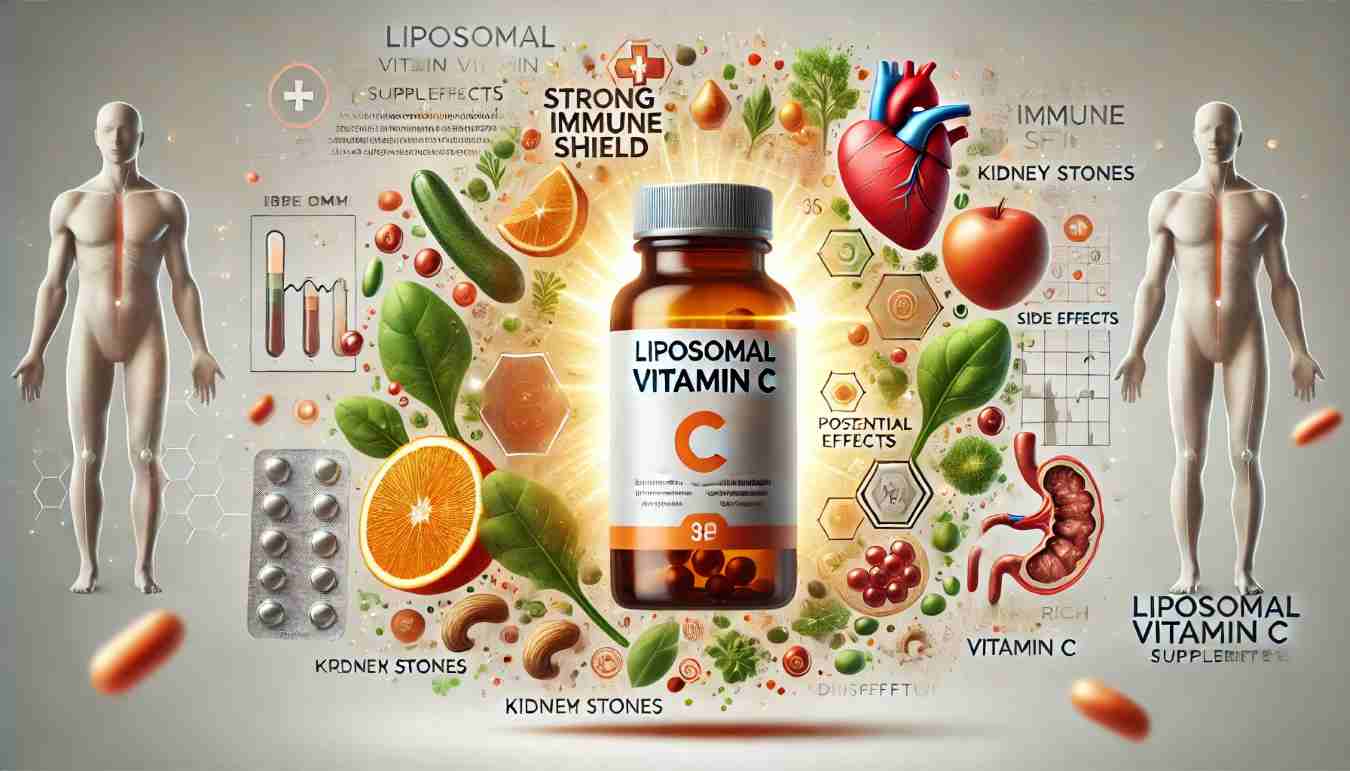Health
Liposomal Vitamin C: Health Benefits & Side Effects

Liposomal vitamin C is a specialized form of vitamin C encapsulated within liposomes tiny, fat-like particles that enhance its absorption in the body. This advanced delivery method allows for higher bioavailability compared to traditional vitamin C supplements, making it a popular choice for those seeking to maximize the health benefits of this essential nutrient.
Health Benefits of Liposomal Vitamin C
Enhanced Immune Support
Folks are well aware that Vitamin C plays a magical role in strengthening the immune system. It helps in the production and enhances the functionality of white blood cells, which play an important role in the overall immune system of the human body. Moreover, vitamin C is needed in the skin barrier, which helps in wound healing as well as acting as an initial line of defence as an antimicrobial barrier. Liposomal vitamin C is absorbed more effectively, guaranteeing affluent amounts of this vitamin to the bloodstream, which could provide truer immune support than the competitor vitamin supplements.
Potent Antioxidant Properties
Recent studies prove that this vitamin serves as a protector of the body from free radicals which are molecules that are likely to form dangerous chemical reactions that can lead to various ailments, including those causing aging. Vitamin C also decreases oxidative stress, and this prevents tissues and organs from being damaged. The liposomal delivery system provides more stability, bioavailability, and an increased level of vitamin C, which is delivered at the cellular level; hence, its antioxidant properties are magnified.
Collagen Production and Skin Health
Vitamin C contributes to the formation of collagen, a protein that forms the basis of skin, bones, tendons and ligaments. It is hoped that appropriate synthesis of this protein will result in the formation of skin that is marginally healthy and more elastic, as well as stronger joints. Due to better adsorption, liposomal vitamin C can promote the synthesis of collagen, which may help improve the overall appearance of the skin and reverse skin ageing signs. In addition, vitamin C assists in the synthesis of collagen and other important collagenase, which are useful for wound healing and maintaining cartilage and bones.
Improved Iron Absorption
Finally, and partly due to the fact that Vitamin C promotes the absorption of non-heme iron, the type of iron found in plant sources of foods and supplements. They are particularly helpful for people who easily become anaemic or who follow a vegetarian or vegan diet. If incorporated into a diet, vitamin C enhances the body’s ability to absorb iron, thus preventing anaemia and boosting energy levels. The boosting of the bioavailability of vitamin C in liposomes guarantees this advantage is optimized in helping to maintain healthy iron levels in the body.
Cardiovascular Support
Moderate consumption of vitamin C has been credited for an enhancement of cardiovascular health. It strengthens the walls of blood vessels such as arteries, maintains healthy blood pressure, and decreases the chances of heart ailments. The mentioned antioxidant effect of vitamin C also helps to avoid the oxidation of LDL cholesterol which is an important cause of atherosclerosis. The higher bioavailability of liposomal vitamin C over standard vitamin C formulations could reflect superior cardiovascular safety.
Potential Side Effects of Liposomal Vitamin C
While liposomal vitamin C is generally well-tolerated, especially at moderate doses, some individuals may experience side effects, particularly when consuming high amounts.
Gastrointestinal Discomfort
Excessive intake of vitamin C causes side effects like stomach ache, diarrhoea nausea, etc. However, since liposomal vitamin C is better absorbed than normal supplements, these side effects might not be as frequently observed as compared to normal vitamin C supplements. One should begin it with a minimum milligram amount and then try to increase the dosage later on in order to know how a specific person can tolerate it.
Risk of Kidney Stones
Intake of large amounts of vitamin C may raise the oxalate concentration in urine, leading to the formation of kidney stones in some people. Daily consumption of vitamin C should not exceed 2,000 mg to avoid this risk as much as possible. Liposomal vitamin C supplements should not be taken by anyone who has had kidney stones in the past without first seeking their doctor’s permission.
Interactions with Medical Conditions and Medications
Some medical conditions, like the excess accumulation of iron in the body and hemochromatosis, should exercise caution because vitamin C boosts the absorption rate of iron. In the same regard, the vice president stated that high doses of vitamin C can interfere with various drugs like blood thinners and chemotherapy among others. Since there are several types of vitamins, and these can interact with the drugs that a person is taking, it is always advisable to consult a doctor before starting a vitamin supplement.
Allergic Reactions
Occasionally, people may have adverse reactions to parts of the liposomal delivery system, which may include soy-based or sunflower-derived phospholipids. Side effects may be in the form of rash, itching or swelling. In the instances where the symptoms that are usually linked to an allergy arise, the product should be stopped, and the doctor should be contacted.
The Bottom Line
Liposomal vitamin C is an improved form of vitamin C supplement with better bioavailability and a number of potential benefits, including aiding the immune system and skin health. However, one should always consider various side effects, which is why starting from the supplementation, one should always consult his/her doctor, especially in case of specific health issues or when taking some specific medications. Thus, one can use the opportunity and avoid the dangers of liposomal vitamin C while getting all the benefits.

-

 Celebrity8 months ago
Celebrity8 months agoThe Private World of Marina Pearl LeBlanc, Matt LeBlanc’s Only Child
-

 Life Style1 year ago
Life Style1 year agoWho is Amra Nor Jenkins? The Untold Story About Jeezy’s Daughter
-

 Entertainment1 year ago
Entertainment1 year agoWhat is Shoujo Ramune? The Comprehensive Guide
-

 Celebrity1 year ago
Celebrity1 year agoThe Untold Truth of William Mapel: A Deep Dive into His Personal Life
-

 Celebrity1 year ago
Celebrity1 year agoWho is Christina Erika Carandini Lee? Everything About Christopher Lee’s Daughter
-

 News1 year ago
News1 year agoRanch World Ads Review: Everything You Need to Know
-

 Celebrity1 year ago
Celebrity1 year agoWho Is Stephanie Sarkisian? All You Need To Know AboutSteve Sarkisian’s Ex-Wife
-

 Celebrity1 year ago
Celebrity1 year agoThe Untold Story of Denika Kisty: Her Family, Net Worth, and More











